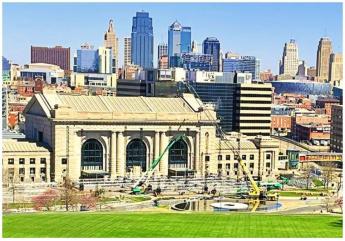Dwayne Huffman and team tackle the NFL Draft’s impact in Kansas City

KANSAS CITY, Mo. — On April 27-29, all eyes will be on Kansas City, Missouri, as it hosts the 2023 NFL Draft.
Millions of viewers are expected to watch the draft on ABC, ESPN, NFL Network and across online streaming platforms. Hundreds of thousands of local and out-of-state fans will gather in person to participate in the festivities at a specially built theme park on the plaza surrounding Kansas City’s historic Union Station.
At the heart of the event, over 200 college football stars will arrive, hoping for a call from an NFL franchise.
Dwayne Huffman will be watching, too. Steps away from the plaza is GSA’s Heartland regional headquarters at 2300 Main St.
As zonal branch chief and regional emergency coordinator, Huffman and his team are charged with keeping GSA’s operations running smoothly in the days before, during and after the event.
Previous Kansas City celebrations made planning for this event smoother, Huffman said.
“Experience from the Kansas City Chiefs’ last two Super Bowl wins and the Royals baseball championship helped us know what to expect on this,” he said, noting that the extended days around this event required additional time and effort.
Huffman also has an edge from his time as a supervisory emergency manager and senior watch officer in Illinois. “I was able to experience something similar to this when the NFL Draft was in Chicago, just a few years ago.”
Conversations and planning for the Kansas City draft began about 90 days before the event. By the end of March, Huffman estimates he and his team have spent close to 40 hours in planning and preparation.
Still, a celebratory 3-day event is leagues away from others Huffman has managed.

In the trenches
A volcanic eruption and earthquake in Hawaii. The “Florida Four” hurricanes, plus Hurricanes Katrina and Ivan. Wildfires. Floods. Tornadoes.
These are just some of the events Huffman has managed and responded to during his career.
His experience spans three decades in operations intelligence, managing and coordinating emergency responses, and helping victims after natural disasters.
“For me,” Huffman says, “it’s been about a breadth of knowledge across career bands. Emergency Management is still somewhat of a small career path, but there’s still a lot of variety to it.”
Emergency exercises and deployments nationwide broadened Huffman’s incident-type exposure.
“Weather patterns (in Kansas City) are a lot different from Chicago and Hawaii,” Huffman says. “And when I would help out with the Region 9 incidents with wildfires, that was something else completely that you don’t necessarily get in the other regions. This is the advantage of moving around.”
Huffman appreciates the impact of his work. “The adrenaline that you get from deploying to an incident and assisting survivors and performing that civic duty - there’s a lot to it,” he says. “You feel things when you respond to these incidents. You’re helping.”
The end zone
Since Huffman has moved into a supervisory role, he has moved from traveling and working directly with survivors to leading management and coordination efforts.
Last summer, he led the GSA portion of the response to floods for FEMA in St. Louis. Though the disaster response has wound down, there is still work to do to close out the event financially.
There is always much to learn.
“Emergency management has evolved fairly quickly,” Huffman says. “It’s constantly moving. The processes have changed, the techniques have changed, the disasters have changed.”
The team is always striving to improve its processes to get better and faster in supporting local and state governments and getting to survivors as quickly as possible.
“What we can do from the GSA side is evolving,” he says. “And so what kind of support we can provide, if things are predesignated … it’s that much quicker we can get supplies or get vehicles or whatever the need is to our customers.”
“I have the advantage of supervising the entire zone, so we can always flex nationally,” Huffman adds. “Any region can support another region. We have that set up so that there are always those backups.”
Every play counts
City-wide celebrations, floods, tornadoes. These are all part of the ebbs and flows of operations for Huffman.
”We run in the background where we’re monitoring. We’re watching. And training. Ensuring that the GSA mission always moves forward,” he added. “One way or another.”
###
About GSA: GSA provides centralized procurement for the federal government, managing a nationwide real estate portfolio of more than 370 million rentable square feet and overseeing approximately $75 billion in annual contracts. GSA’s mission is to deliver the best value in real estate, acquisition, and technology services across government, in support of the Biden-Harris Administration’s priorities. For more information, visit GSA.gov and follow us at @USGSA.

 U.S. General Services Administration
U.S. General Services Administration